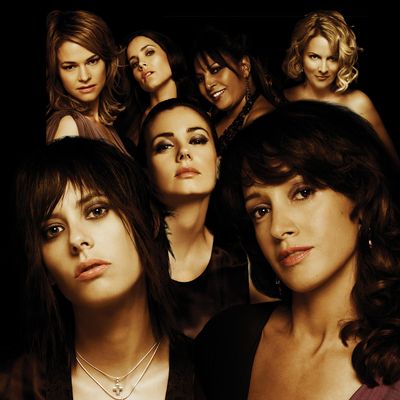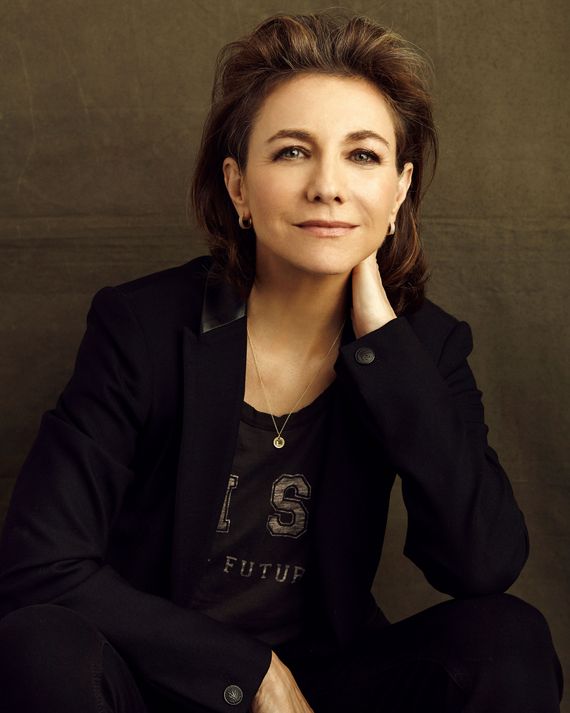
Fifteen years ago, The L Word debuted on Showtime, revolutionizing the way the world viewed lesbians. At the time, the notion that lesbians could be hot and young and femme felt (and, to many, was) revelatory. The L Word made lesbianism more visible than ever, and for many queer women growing up in the ’90s and early aughts, it was the only representation we had access to. I didn’t watch the show until 2008, when it was almost off the air (and I didn’t come out until many years later), but I remember my initial shock in watching the show and realizing I hadn’t seen a single man onscreen.
Most queer women I know have a complicated relationship with The L Word. We are eternally indebted to it, and we are also a little embarrassed by it. Part of our disappointment is born of love, the way anyone’s favorite TV show will inevitably let her down. (Especially when it is the only show you have.) Part of it is political. It’s impossible to watch the show now and not notice absence — of trans characters (especially trans characters portrayed well), of bi and pan characters, of people of color, of anyone older than 40 or above a size 4. In 2005, a TV show could cast an Iranian-American actress as a Mexican-American woman; that can’t happen now.
These are just some of the questions the reboot (titled The L Word: Generation Q) will have to contend with when it airs this fall. In preparation, the Cut spoke to Ilene Chaiken, the series’ creator and original writer-showrunner, about the show’s impact and what she hopes the reboot will do differently.
I heard you got a great reception at L.A. Pride the other weekend.
It was amazing, and very moving. There were tears of joy, and a great sense of being moved by what we’ve done and what we still have to do. Kate and Leisha [Moennig and Hailey, the actors who play Shane and Alice, respectively] were incredibly moved, and so were the Showtime execs who were on the float with me.
I think there were at least a million people in the street yesterday, and the thing we were most struck by was that it wasn’t just the women of our generation — though they were very excited — but it was young women, anywhere from 16 to their early 20s. We would drive past these groups and they would see Kate and Leisha and start screaming and crying and running for the float and jumping up and taking pictures.
How will the original cast members coexist with the new ones?
The three characters who are coming back as series regulars (this is not to say that there won’t be other original cast members who appear on the show or join the show later on)—Bette, Shane, and Alice—are reprising their characters ten years later, so you can imagine, a lot has happened in ten years. Part of what we’ll learn is what’s happened, and then the show will be introducing an ensemble of mostly younger women, who are at a more nascent time in their lives and figuring out who they are. There will be connections between them and the original characters. Some of them will be mentors, but not all older women are suited to be mentors.
Tales of the City was also recently rebooted, and I’m wondering what you think about reviving older queer stories vs. writing new ones.
Well, as a rule I don’t love remakes and reboots. As a writer, I feel like we’ve got lots of stories to tell and we don’t need to constantly repeat ourselves. We rail all the time about our business and the fact that nobody’s doing anything original anymore, and I don’t need to see another remake of this or that. That said, there aren’t a lot of gay shows being told, still. We still are starving for representation, and given that we live in a world where it’s a lot easier to gain traction for an idea when there’s already a beloved title — both Tales and The L Word are iconic gay shows, and because they both are shows about people living their lives, I think they offer an opportunity to [do something new]. How interesting and powerful it will be to talk about how things have changed, and what hasn’t changed.
When you put it that way, it sort of feels like these shows are trying to nudge back open a door that has sort of closed since the originals left the air. We have other queer shows, but maybe not as many as you would have thought when The L Word ended.
That’s why we decided to bring The L Word back. When we ended the show in 2009, I thought, We’re passing the baton, and there will be many more shows that tell stories about lesbians and lesbian lives in all different contexts. I really expected to see that, and it hasn’t happened.
Do you feel even more pressure now, then, returning to that sort of vacuum?
It’s a lot of pressure, but we feel a lot of pressure every time we make a television show — pressure to be as good as we can be, and to say something meaningful. Bring it on.
What does ‘Generation Q’ mean to you?
[Laughs.] I don’t know. Q means “queer,” and I think that more specifically, queer is the word of the moment. There are so many people who identify as queer, and it can mean any number of different things, and it speaks to fluidity and gender and identity in all kinds of ways, so it seems appropriate. It also just says, this is The L Word, but this is The L Word in a new time. It’s an old show but it’s a new show.
Do you anticipate that generational difference in discourse — between lesbian and queer, for instance — will be a big part of the show?
The show will definitely reflect that, as it should. That’s another reason to do the show now, to talk about what’s changed and how people move differently in the world. But fear not: The show is still about lesbians.
Are there things from the original show that you see the reboot as an opportunity to revise or improve?
Absolutely. I’m not writing and running this show, but I’ve talked to Marja Lewis-Ryan, who is the new showrunner and writer, and regardless of whether or not I’d asked her, she would have taken this point of view, that we cast actors who more appropriately represent the characters they’re playing. If there’s a trans character, that character will be played by a trans actor. These are tricky rules that change all the time. I don’t think that an actor has to be gay to play gay, or straight to play straight. But I think that an actor has to be Latina to play Latina, and we will respect those understandings that we’ve gained over the course of the last decade or so.
You obviously have a lot of influence on the reboot, despite not writing for it directly — what is your role going to be, exactly?
I have an exclusive overall deal with Trivia television. That’s where I spend most of my time, working on projects I’m doing there. I’m just checking in, and I’m available as, hmm … What would you call me …
Would it be fair to call you the gay godmother of the reboot?
Yes, you could say that. You’ll see my name as executive producer and creator, but I’m the gay godmother.
Does the show feel any less brave or revolutionary to you now?
I think that it still feels powerful and important. In some ways it’s still revolutionary. If the show had gone on the air a couple of years ago, I think we would have felt like we’re in the midst of a progressive surge, but now we’re not. We know we still have some big battles to fight, and we know that our representation remains fraught. I think these stories would be worth telling regardless, but we’re still girded for battle. I also think that the tensions between generations provide interesting fodder for stories — the different experiences and the things that are appreciated and misunderstood. I hope that will be text and context in the show, too.
There’s as much material as there is potential to make viewers mad.
Exactly. We’ll never please everyone, so the approach is to welcome the conflict.



